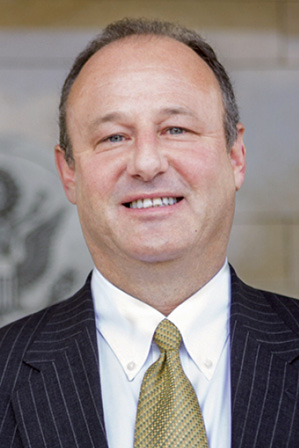COVID-19 and the Path Ahead
President’s Views
BY ERIC RUBIN

Let me start by saluting and thanking our colleagues who have helped bring more than 70,000 of their fellow Americans home from overseas in the midst of the pandemic crisis. This was truly a heroic effort, often under the most difficult circumstances, with canceled flights, closed borders and total lockdown in many countries.
Our colleagues who made this happen across the globe are at posts of all sizes, shapes and varieties. Some are in countries with no viable medical care. Others are in places where the threat of civil unrest and violence is constant.
Many of those who stayed at post to assist with the evacuations did not have to. They chose to do so because they were committed to their work and their mission. This is the U.S. Foreign Service at its best.
So, to our colleagues who stayed and sacrificed under tough conditions to rescue their fellow citizens, thank you. You make us proud—and you show our country who we are and what we do.
Moving on, we have strategic thinking to do about how this extraordinary situation will affect the practice of diplomacy going forward. Will there be more telework and virtual negotiations? Assuredly. Can technology replace human contact in diplomacy? Definitely not.
We are going to need to find a new balance, and to do that we will need to step back from the crisis of the moment to think seriously about how we can do our jobs and advance the national interest in what will certainly be a changed world. In thinking about the future of diplomacy, it is important to draw on the examples and the lessons of colleagues who came before us.
As I did for last month’s column, I went to my bookshelves again this month, and this time found Sir Brian Urquhart’s superb biography of Ralph Bunche, one of the titans of American diplomacy and a true fighter for truth and justice.
Bunche’s life is the story of the triumph of optimism and patriotism. And his accomplishments were stunning. Following his service in the Office of Strategic Services during World War II, he played a crucial role in organizing the Dumbarton Oaks Conference that launched the International Monetary Fund, the World Bank and the postwar global financial system.
He then helped chair the founding session of the United Nations in San Francisco, and from there joined the U.N. as deputy special envoy for the Palestinian conflict.
When the lead U.N. negotiator for Palestine, Count Folke Bernadotte of Sweden, was assassinated by Jewish extremists, Bunche moved up and negotiated the cease-fire that ended the Arab-Israeli conflict of 1949. That earned him the Nobel Peace Prize in 1950. He went on to lead U.N. peace efforts in the Congo, Cyprus, Yemen and Kashmir, ending his career as Under Secretary General for Political Affairs.
It would be hard to match such a career. But here’s the thing. Bunche was African American. When he came to Washington to serve his country during World War II, the only places he could eat were the cafeteria at Union Station and federal agency cafeterias that had recently been desegregated by President Franklin D. Roosevelt. When he moved to New York to join the United Nations, he and his son were denied membership at the West Side Tennis Club in Queens, home to the U.S. Open.
And yet Bunche never wavered in his patriotism, his determination to make a difference and his belief in a better future. Before he died in 1971, he wrote:
“You can surmount the obstacles in your path if you are determined, courageous and hard-working. Never be faint-hearted. Be resolute, but never bitter.” He concluded: “There will be no security in our world, no release from agonizing tension, no genuine progress, no enduring peace, until, in Shelley’s fine words, ‘reason’s voice, loud as the voice of nature, shall have waked the nations.’”
Let’s remember Ralph Bunche as a model of what we seek to be and achieve. And let’s keep those words in mind as we navigate some very difficult times as Americans, as members of the Foreign Service and as patriots.

